During a moving ceremony at the Seventy-fifth World Health Assembly in Geneva, awards were presented to a group of individuals from around the world for their outstanding contributions to public health.
Opening the award ceremony, Dr Tedros Adhanom Ghebreyesus, Director-General of the World Health Organization, said: ”The 2022 public health prizes and awards celebrate people and institutions for successfully addressing a huge array of health challenges around the world. It is an honour for us to come together to acknowledge these true champions of health. I thank the foundations and institutions who so generally support these awards.”
Many of the prizes awarded have been established by, or set up in memory of, an eminent public health professional.
The call for nominations of candidates for each prize is sent out each year after closure of the World Health Assembly. Nominations can be made by national health administrations of a WHO Member State and by any former recipient of the prizes. The 2022 winners were selected at the 150th session of the Executive Board, in January 2022, on the basis of recommendations made by the dedicated selection panels for each prize.
Winners of the 2022 prizes
Ihsan Doğramacı Family Health Foundation Prize
Award winner: Professor Mehmet Haberal, Turkey
This Prize is awarded to a person, or persons, globally recognized for their service in the field of family health.
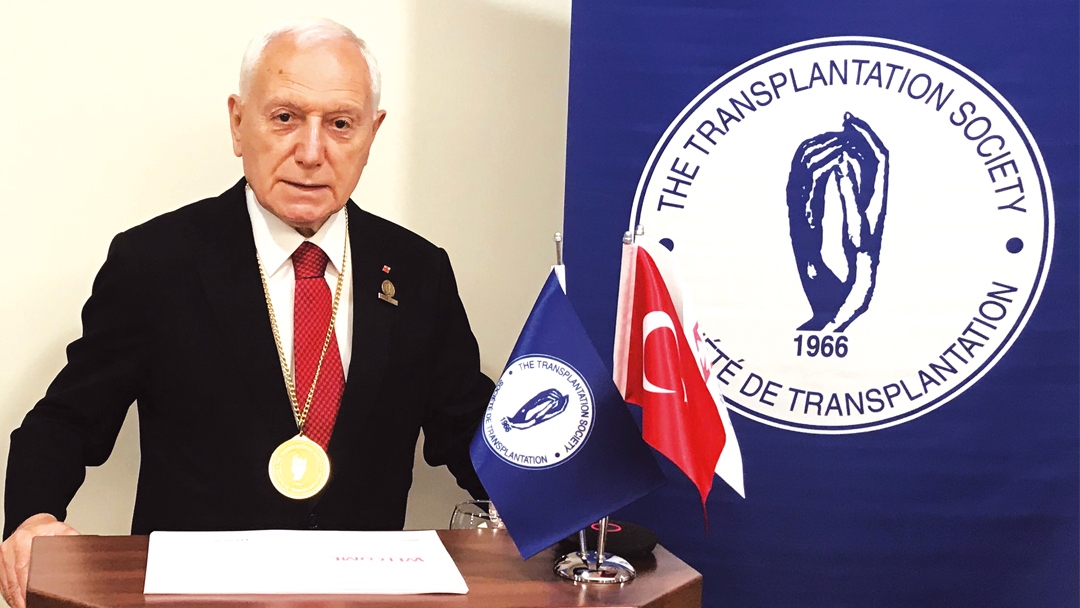
Professor Haberal during the ceremony at which he handed over the presidency of the Turkish Transplantation Society.
Credit: Personal archive of Prof. Haberal
Professor Haberal is a pioneer in the fields of general surgery, transplantation, and burn treatment in Turkey and the world. Founder and President of Başkent University in Ankara, Turkey, and of the University’s Institute of Transplantation and Gene Sciences, he has helped establish a legal framework for organ transplantation, while enhancing its social acceptability through a holistic approach to family and community health, working with families of patients with terminal conditions and with religious leaders. His leadership and collaboration with national, regional and global institutions have led to the creation of numerous organ transplantation centres in Turkey and the training of many health professionals interested in this field of work.
When accepting the award, Professor Haberal said:
“I accept this honor with pride and humility because it is given by WHO and carries the name of Professor İhsan Doğramacı, a monumental international figure in child health. He was my visionary mentor who guided me through the long journey of becoming a transplant surgeon. He devoted his entire life and energy to the advancement of medicine in Turkey and beyond. A global citizen, he was a friend and lifelong supporter of WHO from Day one as he was a signatory to the Constitution of WHO when it was established in New York in 1946. Throughout my career, I have been inspired by the wisdom, energy and courage of this extraordinary leader and have followed his footsteps.”
Sasakawa Health Prize
Award winner: Dr Paisan Ruamviboonsuk, Thailand
This Prize is awarded for outstanding innovative work in health development to a person or persons, an institution or institutions, or a nongovernmental organization or organizations. Such work includes the promotion of given health programmes or notable advances in primary health care.
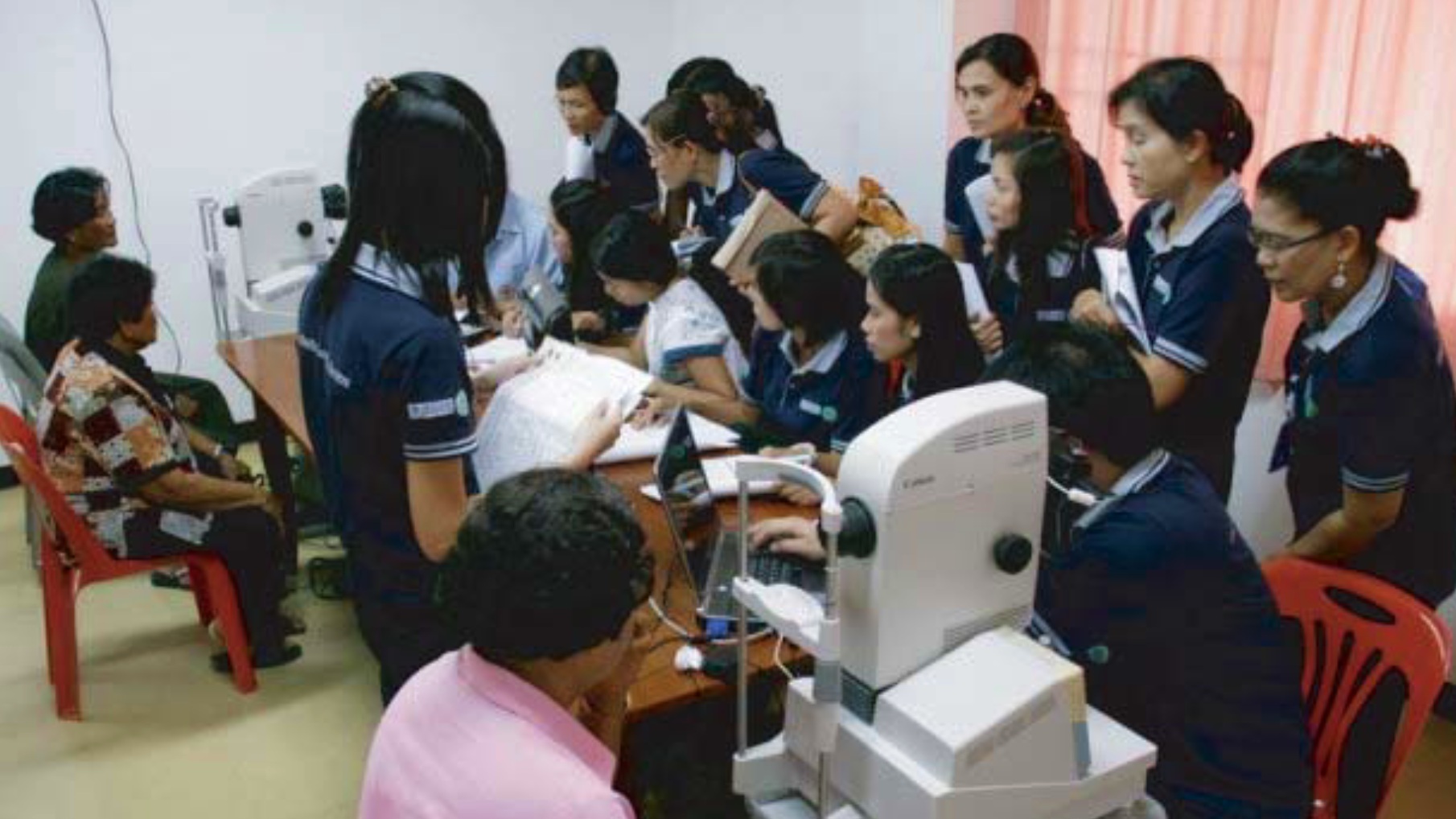
Training of health personnel to detect diabetic retinopathy.
Credit: Department of Medical Services, Thailand
Dr Ruamviboonsuk is an ophthalmologist specializing in retinal eye care. Over the past 25 years, Dr Ruamviboonsuk has focused on addressing the second leading cause of blindness in the country – diabetic retinopathy (DR). He invented and applied a special screening method, then piloted an initiative to train non-ophthalmological personnel to use it and be able to correctly detect retinopathies everywhere in Thailand, even in the most remote areas. This is particularly important given the shortage of ophthalmologists and that most cases used to remain undetected at the early stages. As a result of his work, DR screening is now a nationwide programme run by the Ministry of Public Health, free of charge for all. Dr Ruamviboonsuk continues exploring the use of innovative technologies and artificial intelligence to improve the eye health of patients.
When accepting the Prize, Dr Ruamviboonsuk said:
“The latest survey of blindness in Thailand found that diabetic retinopathy was no longer the leading cause of retinal blindness in the country. The project is entering a new phase of using artificial intelligence to assist in detecting the referrals and integrating AI into the current workflow of our national screening programmes. The success is an example of applying the latest appropriate technologies for primary eye health. However, the number of people living with diabetes is rising, and throughout the world globally, there are close to 1 billion people living in darkness because of preventable blindness. We hope that our project from Thailand may serve as a model for other countries. This Prize belongs to all the health-care personnel in Thailand involved in the project during this more than 20-year long journey.”
United Arab Emirates Health Foundation Prize
Award winner: Nicaragua’s National Malaria Component of the Ministry for Citizen’s Power for Health, with support from the community network of voluntary collaborators (ColVol)
The United Arab Emirates Health Foundation Prize is awarded to a person or persons, an institution or institutions, or a nongovernmental organization or organizations, for an outstanding contribution to health development
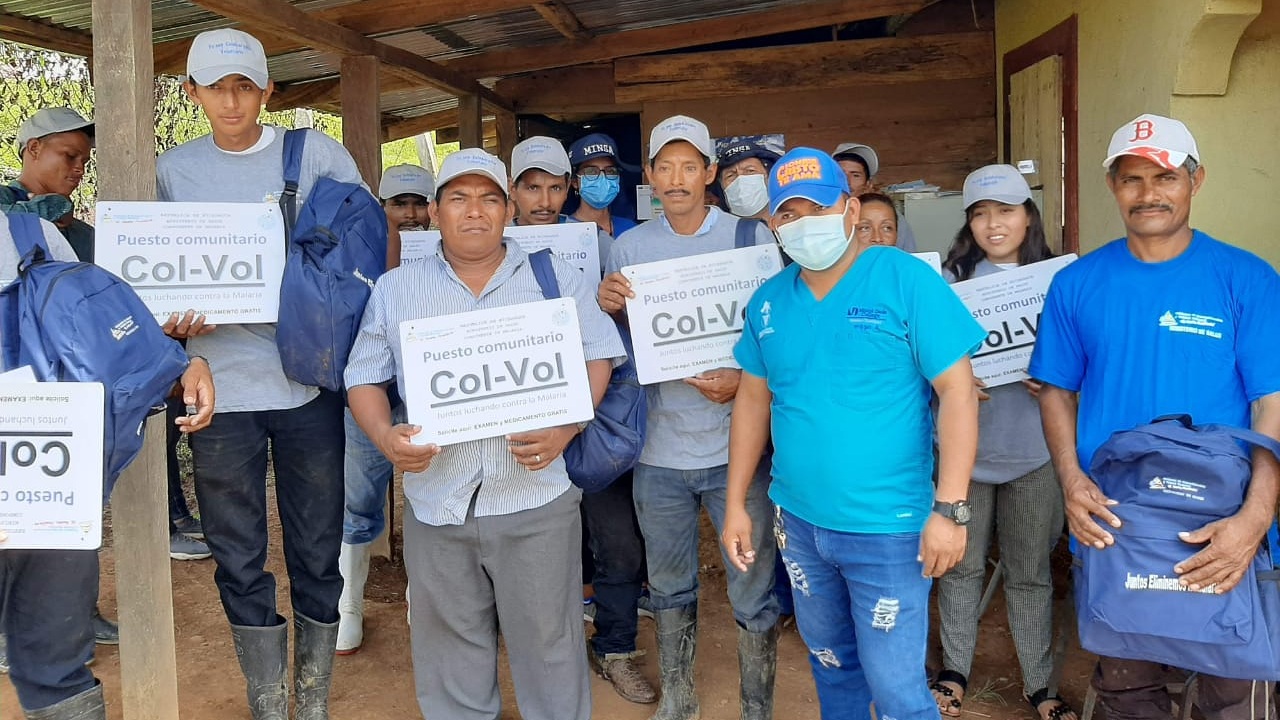
Meeting of volunteer collaborators in the health post of the Nazareth community in the municipality of Puerto Cabezas, where ColVol and health ministry provided supplies and personal protection equipment for malaria (caps, backpacks, capes, rubber boots, T-shirts, signs and replacement material, bed-nets etc.).
Credit: ColVol
The National Malaria Component of the Ministry for Citizen’s Power for Health of Nicaragua, with support from the community network of voluntary collaborators (ColVol), has been key in implementing the national programme of malaria control for over 50 years. ColVol is a community of local health workers who focus on the surveillance, diagnosis and treatment of malaria in the municipality of Puerto Cabezas, Nicaragua. Leaders in community engagement, they reach remote and ethnically diverse communities with essential services. The work of the National Malaria Component is a tribute to the power of community-based services for the benefit of local populations. This collaboration can be replicated beyond its specific setting and towards the goal of universal health coverage. The burden of disease of malaria has significantly decreased in the communities served as well as nation-wide, which reveals the impact of their work.
In his pre-recorded speech to accept the Prize, Dr Cristhian Toledo, General Director of Health Surveillance of the Ministry of Health of the Republic of Nicaragua, said:
“Our country has developed valuable experiences in community participation in health; volunteer collaborators (ColVol), health promoters and community leaders have played a fundamental role in this process. One of the results of the ColVol's performance is the reduction of 56% of malaria cases at the national level. The 9183 ColVol members, organized in communities and neighborhoods throughout the country, are trained by the Ministry of Health, so that they can take action towards malaria elimination with, for instance, active search for fever cases, collection of thick drop samples, delivery of treatment for patients and mosquito nets to people in the communities, sanitation for vector control, and sensitization of all community members. As part of this process, our government has strengthened bi-national alliances with the republics of Honduras and Costa Rica to combat cross-border transmission of malaria. It is with deep gratitude and commitment that we receive this important award, a prize that the health foundation of the UAE gives to the people and the government of the Republic of Nicaragua.”
His Highness Sheikh Sabah Al-Ahmad Al-Jaber Al-Sabah Prize for Research in Health Care for the Elderly and in Health Promotion
Awardee: Dr Hanadi Khamis Mubarak Al Hamad, Qatar
This prize is awarded to a person or persons, an institution or institutions, or a nongovernmental organization or organizations having made an outstanding contribution to research in the areas of health care for the elderly and in health promotion.

Committed to building patient-focused teams: Dr Hanadi Al Hamad at the opening ceremony of a new facility for geriatric care and healthy ageing.
Credit: Hamad Medical Corporation, Qatar
Dr Hanadi Khamis Mubarak Al Hamad is Qatar’s national lead for healthy ageing at the Ministry of Public Health and senior clinical leader for geriatric, long-term care and rehabilitation services. Dr Al Hamad is the Chairperson of Geriatrics and Long-Term Care at the Hamad Medical Corporation, Qatar and has spearheaded the development of innovative programmes such as geriatric virtual clinics for older people and an urgent day-care unit. As a result of her outstanding work, there has been a 20% increase in bed capacity in long-term care; mobile- and home-care services are now fully integrated; a dedicated web page for older people now provides information about healthy ageing; and community rehabilitation and memory clinic services have expanded at the primary care level.
When accepting the Prize, Dr Hanadi Al Hamad said:
“This award is very dear to me in many ways. It is a recognition for me and my team, for all those people working tirelessly for the betterment of older adults. It is also a recognition of the efforts of the Ministry of Public Health of the State of Qatar to promote better health. Our goal is to provide safe, compassionate, easily accessibly care for older adults – with a focus on health promotion and community wellbeing, by working with other sectors and agencies. Even though we made great strides, we face challenges, too. However, I have been fully supported by our ministry, my senior leaders and my organization. And I get support and blessing from our patients and their families, in the way they call me “a daughter of Qatar”. I know there is a long journey but together we shall get there.”
Dr LEE Jong-wook Memorial Prize for Public Health
Award winners: Professor Prakit Vathesatogkit, Thailand, and the Severe Hypothermia Treatment Centre, Poland
The Dr LEE Jong-wook Memorial Prize for Public Health is awarded to a person or persons, an institution or institutions or, a governmental or nongovernmental organization or organizations, who have made an outstanding contribution to public health.
Professor Prakit Vathesatogkit, Thailand
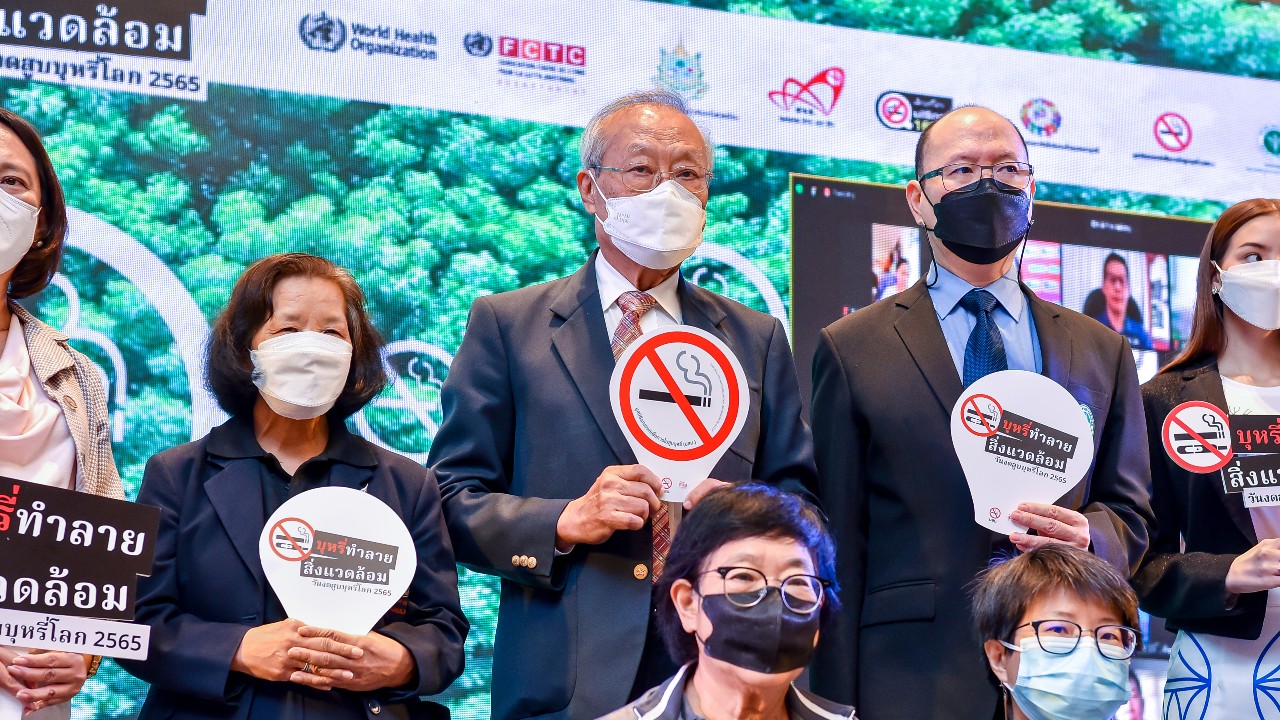
Prof. Dr. Prakit Vathesatogkit at the Stakeholders' Consultation and Press Conference for the World No Tobacco Day 2022 in Bangkok Thailand, 17 May 2022.
Credit: Thai Health Promotion Foundation
Professor Prakit Vathesatogkit has been Executive Secretary of the Action on Smoking and Health (ASH) Foundation since 1986 and is a member of the National Committee for the Control of Tobacco Use at the Ministry of Public Health of Thailand. He has served in multiple advisory roles in the context of the WHO Framework Convention on Tobacco Control. His lifelong ambition is to reduce the prevalence of lung cancer in Thailand. He has devoted his professional life to tobacco control, resulting not only in improved treatment and care protocols for patients, but also in an impressive array of tobacco control measures, including tobacco taxes and restrictions on tobacco advertising and sports sponsorship. Professor Vathesatogkit is a pioneer in advocating for these measures and works across sectors, engaging the general public and developing and empowering networks.
When accepting the Prize, Professor Vathesatogkit said:
“I served over a decade as a faculty member of the Ramathibodi Faculty of Medicine, Mahidol University, Thailand, teaching about and treatinfg pulmonary diseases. But when I volunteered to be involved in tobacco control in 1986, I was struck by the efforts of the tobacco industry to perpetuate extreme human suffering caused by nicotine addiction, tobacco induced diseases and premature death. I felt a duty to take the challenge and build alliances in all walks of life in Thai society, to fight this destructive epidemic and to extend it to other regions of the world. Although the tobacco control movement and measures in the last 35 years have reduced the projected number of smokers, tobacco use is still the number one preventable cause of premature death in Thailand. Accepting this Prize, I pledge to continue my work on tobacco control, to fulfill my longstanding commitment to health, and to galvanize health professionals to join the fight for a smoke-free world. I believe it can and will be done.”
Severe Hypothermia Treatment Centre, Poland
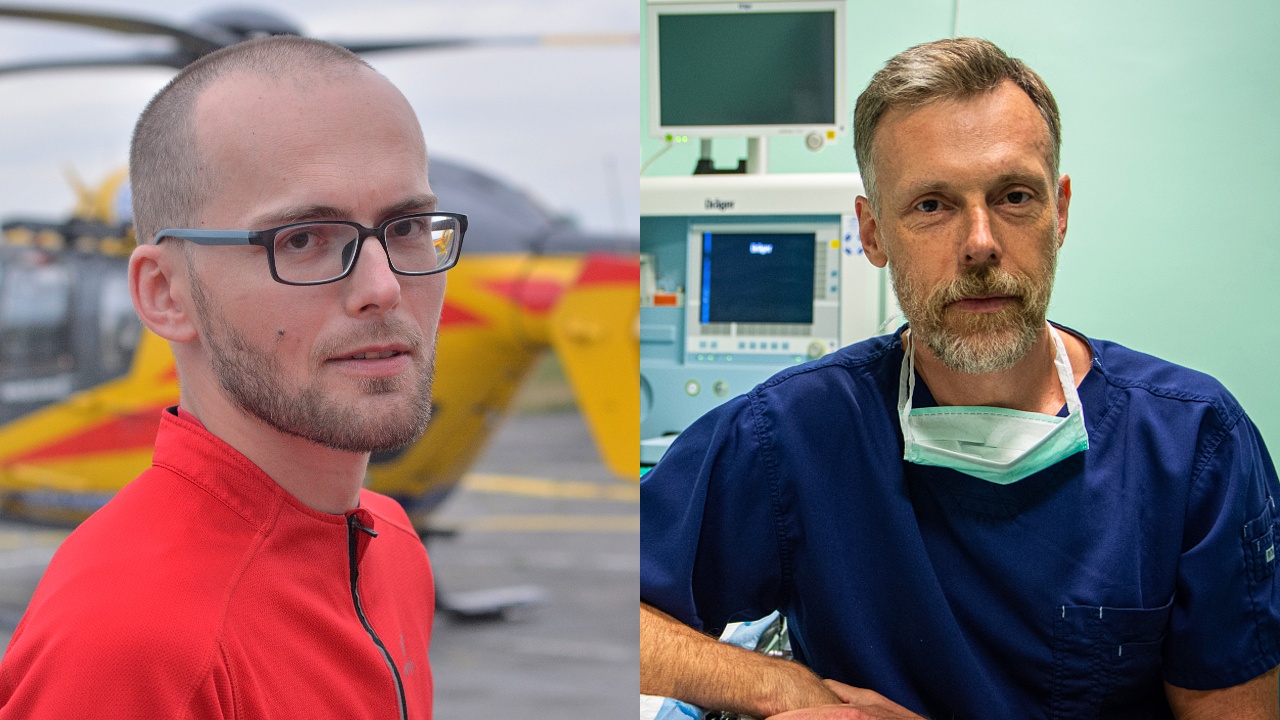
Dr Tomasz Darocha, an expert in the field of extracorporeal therapy, and Dr Sylweriusz Kosiński, a specialist in anesthesiology and intensive care, launched the idea for establishing the Centre.
Credit: Jaroslaw Sosnowski and Regina Watycha
Poland’s Severe Hypothermia Treatment Centre was the first Polish facility dedicated to treating hypothermic patients and one of the world's first medical centres dedicated to the treatment of accidental hypothermia. Dr Tomasz Darocha, an expert in the field of extracorporeal therapy, and Dr Sylweriusz Kosiński, a specialist in anesthesiology and intensive care, launched the idea for establishing the Centre. The Centre has initiated numerous research and development projects to design modern technological solutions – applications, devices and protective agents used in the diagnosis and treatment of hypothermia.
The Centre organizes trainings promoting early management of hypothermia involving relevant stakeholders, including first responders, nurses and doctors to improve chances of survival for hypothermic patients.
The doctors and experts working at the Centre combine their medical and research work with social work, noticing the problem of “urban hypothermia” and in recognition of the social dimension of accidental hypothermia, e.g. the risks for people in situations of homelessness or poverty. This holistic approach enriches the understanding of severe hypothermia globally.
When accepting the Prize on behalf of the Severe Hypothermia Treatment Centre, Professor Kosiński said:
“We are extremely honored and earnestly grateful for the recognition we have received for our work. Accidental hypothermia is a problem that humanity has been struggling with since the dawn of time. In the face of global warming, it may seem the problem no longer exists. But it does. Unfortunately, hypothermia still kills people in every latitude. This award is not only a distinction for us, but also a challenge. We have not yet said the last word. Everything we have achieved so far is only the beginning of what we can still achieve. This Award will enable us to have a greater impact on the health-care system. We have faced challenges but each of them only strengthens us as a team. We continue our work to raise public awareness of this deadly threat.”
Nelson Mandela Award for Health Promotion
Award winner: Dr Wu Zunyou, China
The Nelson Mandela Award for Health Promotion is awarded to a person or persons, an institution or institutions, a governmental or nongovernmental organization or organizations, who have made a significant contribution to health promotion.
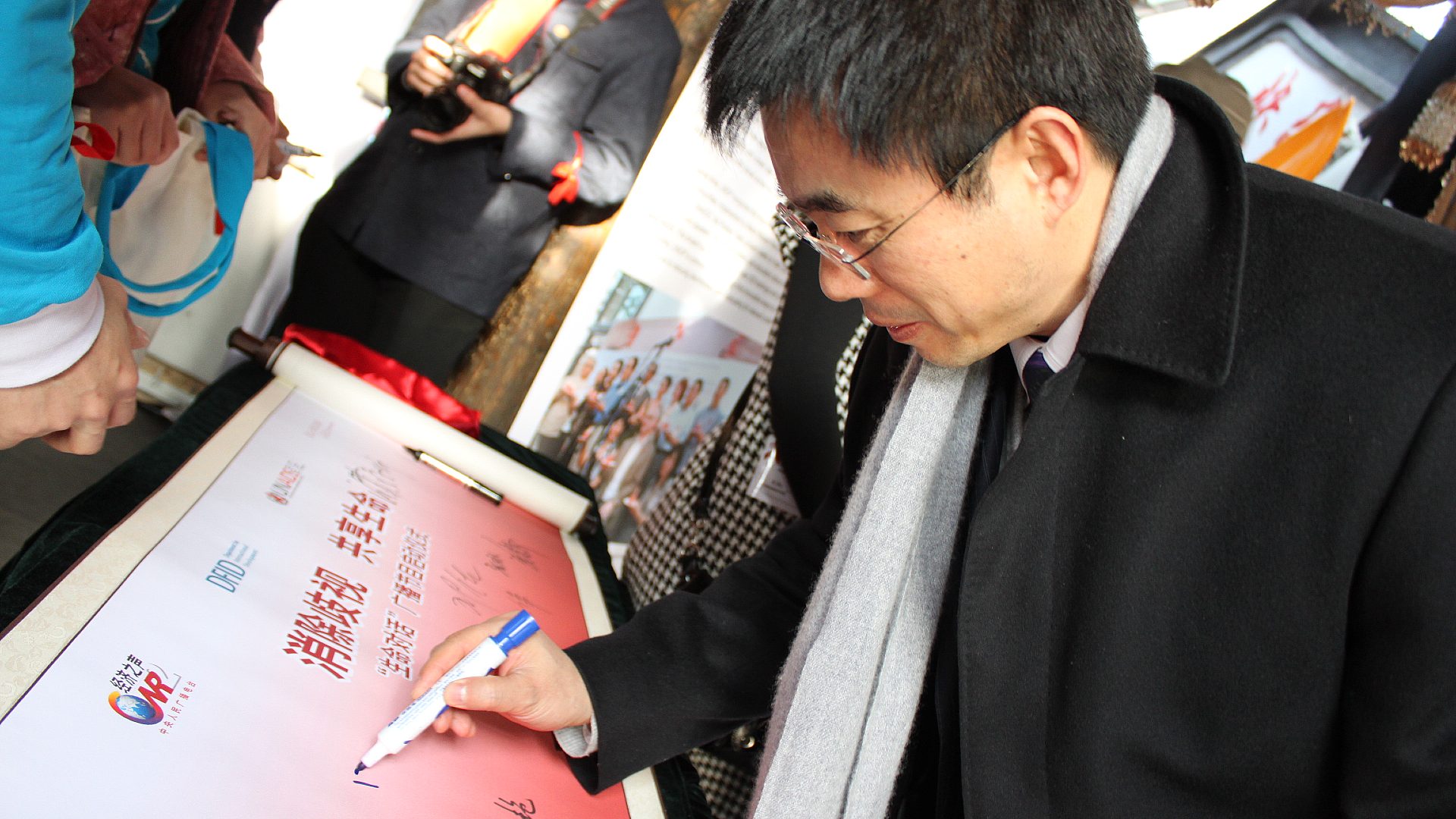
Dr. Zunyou Wu signing an anti-stigma public statement in a community of men having sex with men.
Credit: Chinese Centre for Disease Control and Prevention
Dr Zunyou Wu is the Chief Epidemiologist at the Chinese Center for Disease Control and Prevention. His achievements in the field of HIV/AIDS prevention are outstanding, for instance the innovative, evidence-based policies he had built to reach groups most vulnerable to HIV/AIDS. He was a pioneer in designing, piloting and scaling-up outreach programmes among sex workers. He established China’s first needle-exchange programme and its first large-scale opioid replacement treatment. The impact of these measures has been significant: today, drug users represent 1% of all HIV infections in China, while in 2004, they represented half.
As a result of Dr Wu’s work, HIV testing is now a key prevention tool among all vulnerable groups, with about 300 million tests carried out in China in 2020. Dr Wu’s recommendations on outreach interventions for vulnerable groups have become national policy. His work has been recognized in China and globally.
When accepting the Award, Dr Wu said:
“I am extremely honored to be receiving such a prestigious award and grateful for the recognition for my work. I remember that back in 1991, in university, I was shocked finding out that some of the lecturers were men who had sex with men, while others used drugs or lived with HIV. I want to thank professor Roger Detels and Professor Zeng Yi who taught me a non-judgmental and non-discriminatory attitude towards people at risk of HIV infection. I also thank all health professional outreach teams and peer volunteers from key populations, who have worked together to promote HIV prevention programmes among sex workers, people who use drugs, and men who have sex with men in the past 30 years. Health promotion among key populations needs to be continued. I will continue this very important work.”
